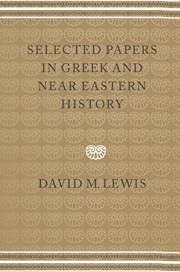Book contents
- Frontmatter
- Contents
- List of plates
- Preface
- Systems of reference
- GENERAL
- 1 Boeckh, Staatshaushaltung der Athener, 1817–1967
- 2 On the new text of Teos
- 3 The origins of the First Peloponnesian War
- 4 The federal constitution of Keos
- 5 The Athens Peace of 371
- 6 Preliminary notes on the Locri archive
- 7 Temple inventories in ancient Greece
- 8 Democratic institutions and their diffusion
- ATHENIAN
- NEAR EASTERN
- Bibliography
- Publications of David M. Lewis
- Indexes
1 - Boeckh, Staatshaushaltung der Athener, 1817–1967
Published online by Cambridge University Press: 15 January 2010
- Frontmatter
- Contents
- List of plates
- Preface
- Systems of reference
- GENERAL
- 1 Boeckh, Staatshaushaltung der Athener, 1817–1967
- 2 On the new text of Teos
- 3 The origins of the First Peloponnesian War
- 4 The federal constitution of Keos
- 5 The Athens Peace of 371
- 6 Preliminary notes on the Locri archive
- 7 Temple inventories in ancient Greece
- 8 Democratic institutions and their diffusion
- ATHENIAN
- NEAR EASTERN
- Bibliography
- Publications of David M. Lewis
- Indexes
Summary
A venerated teacher, in whom the best of the Berlin tradition is still alive, once said firmly to me that he supposed that the essentials of the things that interested me had changed very little since Boeckh. I would not now endorse this view, and this morning I am neither fighting a campaign to encourage more reading of Boeckh as a source of information, even in Fränkel's third edition, nor advocating the sort of piety which led Fränkel to reprint all Boeckh's errors with warning footnotes. However, I do think that there are reasons to commemorate the hundred and fiftieth anniversary of the Staatshaushaltung, particularly before an epigraphical congress.
We see in it first the first great example of Alterthumswissenschaft, an attempt to grasp and describe essential elements in the life of a people where there were no classical forerunners to define the scope of the subject. The general impulse to see ancient life as a whole certainly came to Boeckh from his teacher Wolf. His early works however do not make straight for this goal. In Göttingen, Schleiermacher had given him Platonic interests, and student poverty in Berlin made him, in a strange collocation, the tutor of the fifteen–year–old Meyerbeer, who wanted to learn Greek and Latin for the sake of musical theory. Plato and musical theory produced an interest in Pythagoreanism, in itself and in Plato; and problems of authenticity, in Plato and the tragedians, also interested him in these early years. A nearer approach to universalism came as he started serious work on Pindar, though that also started from musical interests.
- Type
- Chapter
- Information
- Publisher: Cambridge University PressPrint publication year: 1997



